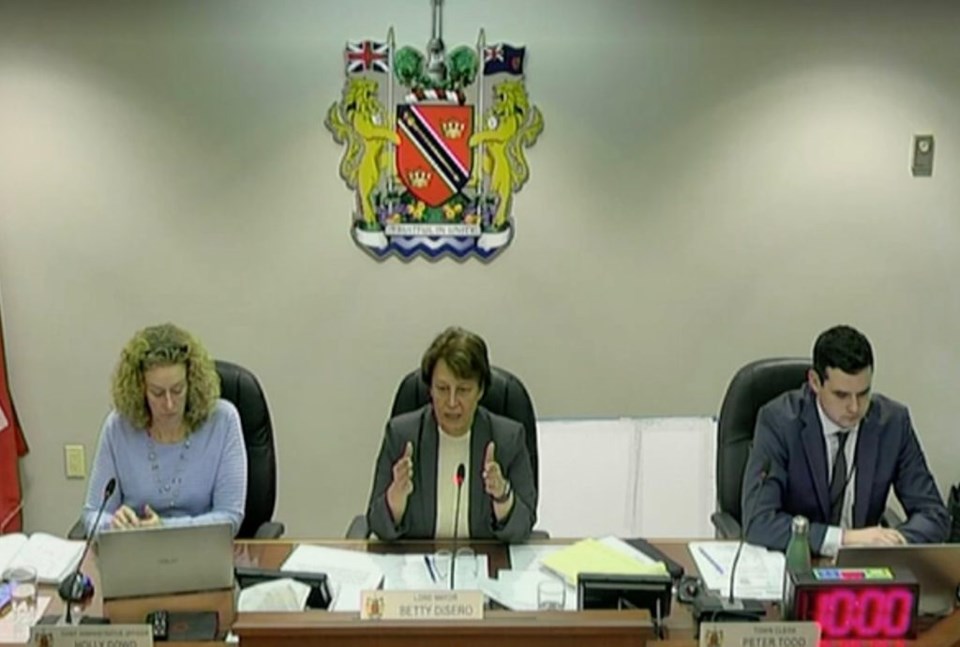
Niagara-on-the-Lake’s 2019 budget increase should be capped at 4.5 per cent for taxpayers, council decided Monday, but also acknowledged there is a lot of work to be done to get there.
Councillors made many motions during the meeting, asking for additional information before approving the draft operating budget, and attended a workshop Tuesday morning which gave them their first look at the capital budget. Following that opportunity to request more changes, Lord Mayor Betty Disero said it will take a month longer than expected for the final numbers to be ready for approval. In the meantime, staff will be looking at every avenue to whittle down expenses to get to the goal council has targeted.
The budget was initially expected to be approval by the Jan. 14 meeting, but with the information councillors were requesting from staff, and a commitment to have two public consultation meetings before presenting the final budget to council, it will be February before it’s completed, said Disero.Although in recent years the Town has worked to finalize the numbers by December, the Municipal Act states that following an election of a new council, the budget can’t be passed before Jan.1, she said.
At Tuesday’s workshop on the capital budget, which funds large-ticket items and puts money away for future projects, councillors looked at taking $2.47 million from the operating budget, which covers annual expenses and revenue. The figure was based on past years and the cost of inflation, said Disero.
“Even if we do that, with all that is on the capital lists we have now, we’re $1.4 million short (on the capital budget). We still have to find another $1.4 million. We’re really going to have to look at priorities.”
That also means there is less to fund operating costs, she explained, but by looking at tightening up expenses and finding other sources of revenue, the goal is still to limit the increase to 4.5 per cent, as suggested by Coun. Allan Bisback — while finalizing a budget that is not only reasonable for taxpayers, but sustainable for the future.
Projects that aren’t a priority, “that are a little bit of a luxury,” may have to be cut, she said.
One of the motions approved Monday was to stop the practise from past years of taking money from capital reserves to limit increases to the tax levy, which puts more pressure on cutting expenses and increasing revenue for 2019.
To that end, a motion made by Coun. Clare Cameron to raise parking rates by 25 cents an hour was approved by council. That was an easy one, said Disero, that can be implemented to increase revenue in 2019. “We voted on it and it’s done.”
Other suggestions will take more time, and will be considered for the future. That includes her motion to have concessions in Simcoe Park and Queen’s Royal Park that would encourage active transportation, such as paddle boarding.
Cameron took that idea one step further and asked that food and beverage concessions — not permanent structures but possibly pop-ups and food trucks — also be considered. Although the motion passed, it will take time, public consultation, staff reports and a “thoughtful discussion” before arriving at a decision, Disero said, which will not take place in time to affect the 2019 budget.
Many of Monday’s motions that were approved will require extensive staff time, such as several requests from Coun. Stuart McCormack including one to look at all Town contracts. He also asked for a report on the negotiation for the lease for the coffee shop in the community centre, a report on the viability of the Queenston fire station, a report on “fair market value” for renting space in the Court House along with information about the amount current tenants are paying, and a report on Town staff salaries.
Another of McCormack’s motions was for organizations which traditionally receive money from the Town, such as the chamber of commerce, the historical society, the library and Niagara College, be required to provide extensive documentation of finances.
Disero said she appreciates the efforts to reduce expenses and get the budget down to something reasonable, because the direction in which the Town was going “is not sustainable.”
“I like the idea of giving the direction of a cap to staff, but also think we should be in control of the budget, and not hamstring the staff.”
But she said she found some of McCormack’s motions harsh, unreasonable, “and not a direction I would like to see the council go.”
In response to the comment of being harsh, McCormack said grants over the last three years were higher than budgeted. “I’m asking for some degree of accountability.”
He objected to being called unreasonable with his requests. “We have a fiduciary duty to deal with other people’s money," he said.
Cameron said she wants to see the Town being a “goal-driven organization," suggesting it’s never too early to start setting goals. “Let’s work towards this see and see how we go. If it happens in phases so be it.”
“The most important thing we’re going to do is get a budget that we’re all responsible for,” said Coun. Gary Burroughs.
“The budget is not just about ending up with a 4.5 increase,” he added, and suggested a special council meeting in the new year might be necessary. He also asked for more details to be included in the budget, based on actuals for the last three years, but although he acknowledged it will take staff time to come up with the information requested by him and others, “it is critical to this new council,” he said.
“Instead of worrying about getting it down to 4.5 per cent, let’s worry about getting it right.”